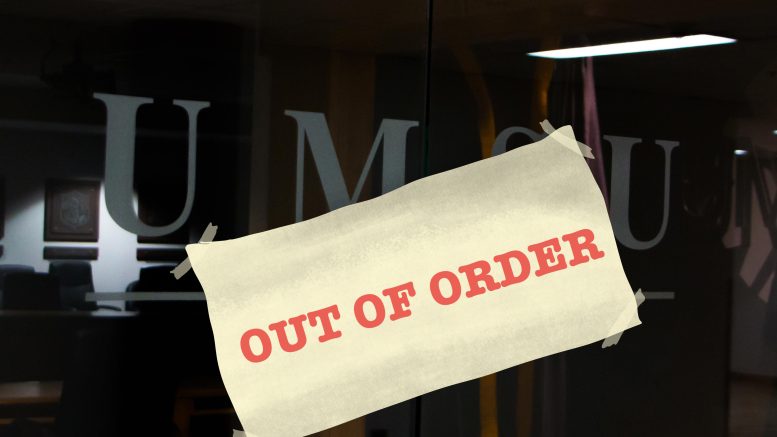During a nearly four hour special UMSU board meeting last Thursday featuring what UMSU president Jaron Rykiss called a “very heated, emotional” debate, a motion to hold a revote for the position of UMSU president was ruled out of order.
This is the second time a motion to hold a revote for presidential election was ruled out of order. The first was moved by the UMSU chief returning officer (CRO) at an emergency meeting held on March 13 following the disqualification of presidential candidate Justin Langan.
At 2 p.m. on March 8, Langan was disqualified from the race. That same day at 11:17 p.m., Langan submitted an appeal of his disqualification to the judicial board. A hearing took place on March 9 at 6:15 p.m.
The judicial board chose to take a break until the next day following its meeting with Langan to include a third board member in order to reach a unanimous decision. At the time, the judicial board only had three members due to the recent resignation of four individuals.
The judicial board upheld Langan’s disqualification and informed the CRO at 3:20 p.m. on March 10. An email was sent to students announcing the ruling with only 45 minutes left to vote in the election. Langan received 22.1 per cent of the vote.
A petition to hold a second board meeting concerning a revote gathered 50 signatures, including numerous student group leaders, UMSU board members and representatives. Langan and presidential candidates Roleen Alarab and Victoria Romero — who altogether received 67.1 per cent of the presidential votes — also signed the petition.
The petition argued that the judicial board failed to schedule a meeting for Langan within the required timeframe, did not have enough members to reach quorum and failed to announce its decision by the required deadline.
Judicial board presents its case
At the meeting, judicial board member Elbethel Masresha gave a presentation explaining the judicial board’s view. Masresha asserted that the judicial board had a total of 24 hours after the end of the initial meeting with Langan to make its decision, explaining that the election manual stipulates it may call a recess of 12 hours and must announce a decision within 12 hours of the end of the meeting — meaning, according to Masresha, that the board would have had to announce its decision by 6:15 p.m. on March 10. The judicial board issued its decision at 3:20 p.m. on March 10.
Masresha cited a section of the election manual stating that all rulings from the judicial board should be “final and binding,” and that there is no appealing its decision on an appeal.
Masresha disputed the argument that the judicial board did not have quorum, saying that quorum was “not applicable in this situation,” as points 26 and 27 of section seven of the UMSU Governance and Operations Manual — which specify that the judicial board must have six members present in order to reach quorum for a hearing — are in reference to hearings for complaints against UMSU executives or board and committee members, as well as appeals regarding those complaints.
She claimed that the entire board did not have to be present for the hearing as it was “an information gathering hearing and not a setting where any motion or formal decisions are made.”
There is no definition of an “information gathering hearing” in UMSU’s governing documents.
Masresha also referenced sections of Robert’s Rules of Order — a guidebook for parliamentary procedure used by UMSU — which states that quorum shall be defined as the majority of board members, unless a different quorum is provided by other governing documents. She pointed out that the elections manual does not stipulate quorum for complaints or appeals.
UMSU’s bylaws state that the bylaws themselves are given precedence over the union’s Governance and Operations Manual, Robert’s Rules of Order and the Election Manual.
UMSU’s bylaws state that quorum for the judicial board must be six members, and that “no action of a governing body shall have any force or effect in the absence of quorum.”
The bylaws also specify that the Governance and Operations Manual supersedes the Election Manual. The former stipulates that the judicial board must have no fewer than eight members.
The judicial board decided not to overturn the CRO’s decision to disqualify Langan and counted votes for him as abstentions.
Masresha said that the board did not consider this issue to have the potential to void the results of the election, but viewed it as a decision regarding a violation from an individual campaign that “lacked integrity.”
The judicial board’s presentation was followed by a question period which lasted for over an hour.
Nathan Dueck, who attended the meeting as a student-at-large, argued that the meeting with Langan to hear his appeal and the meeting the next day to make a decision should be considered two separate meetings.
Masresha explained that the judicial board chose to take a break until the next day to include a third member of the judicial board in order to reach a unanimous decision. She acknowledged that she “didn’t explicitly call a recess” or motion for one at the end of the meeting with Langan on March 9.
Dueck argues for a revote
Dueck, who was involved in the effort to gather signatures to hold the special board meeting and drafted the motion to hold a revote, also gave a presentation laying out the case for holding a revote.
In his presentation, Dueck referenced sections of the UMSU Elections Manual which state that an election, or part of an election, may be declared void if there is a “serious contravention of the election” resulting in an outcome that “could not reasonably be deemed to indicate the actual preference of the voters.”
“It doesn’t mean there has to be a bomb threat,” Dueck argued. “It doesn’t mean there has to be ballots stuffed.”
“It just means that something happened that was so remarkable that it calls into question who actually won.”
He pointed out that the Elections Manual also stipulates that if a violation may result in a voiding of the election, any appeal hearing concerning that violation must be held within 12 hours of receiving the appeal.
Dueck argued that since students voted for Langan while the judicial board made its decision, the election could not be said to represent the will of the voters. Langan received 912 votes, significantly more than the margin between winning candidate Tracy Karuhogo and runner-up Victoria Romero. Karuhogo won by a margin of 16 votes.
Dueck pointed out that Robert’s Rules of Order state that calling a recess requires a motion and argued that since the judicial board failed to put one forward, it should have announced its decision within 12 hours of the end of its meeting with Langan.
“I also want to say that in contrast to some other perspectives, I’m a lot more concerned about the voters who voted for Justin on Friday, the voters who voted for Justin not knowing the outcome of the appeal, assuming that they were voting for a legitimate candidate who could have won the election,” Dueck said.
He called on UMSU to hold a simple revote of the presidential election without campaigning.
“I think that we owe it not just to the students, but to the candidates, to give whoever wins a mandate that is not blemished by allegations of procedural conventions that were not followed,” Dueck said.
Motion ruled out of order
Following both presentations and close to an hour of questions after Dueck’s argument, interim board of directors chair Lauren Slegers ruled the motion to hold a revote out of order.
The chair said that she waited until after the presentations to declare the motion out of order because the UMSU Governance and Operations Manual stipulates that the chair may only do so once all presented motions are brought to the board. She said that she wanted to ensure that both sides were given an opportunity to make their case before the board and allow for discussion.
Slegers further explained that the motion was ruled out of order because the UMSU bylaws state that the decisions and actions of the judicial board cannot be overturned by any other UMSU governing body.
UMSU governance committee chairperson Ivan Nuñez Gamez called a point of order objecting to this statement, reasoning that the judicial board did not have quorum to make its decision — a point to which Slegers declined to respond.
Slegers also argued that the Election Manual states that only the judicial board has the ability to void an election. Slegers made the case that even if the judicial board did not have quorum, it did not invalidate the entire election and said that UMSU’s legal counsel had been consulted on her decision.
Following an appeal of chair’s ruling, members of the board and attendees of the meeting were given half an hour to voice their support or opposition to the decision.
Some expressed dismay that the chair was refusing to allow a vote on an issue brought before the board a second time.
Some of those supporting the chair’s ruling argued that she was correct in her interpretation that the judicial board’s decision could not be overruled and expressed concern about the precedent it would set if it was. Some also made the point that although the lack of clarity in UMSU’s governing documents is less than ideal, the way to prevent similar situations in the future is to change the documents themselves, and that the debate was merely going around in circles.
Senior stick of the Manitoba Medical Students’ Association Anthony Wightman had the last word in the discussion before the vote. He disputed the argument that fixing the bylaws is something that should wait until next election.
“Alternately, you could do that now,” he said.
Following discussion, the board voted by a simple majority to rule the motion to hold a revote out of order.
After the vote, Rykiss said that there are “always going to be situations where people aren’t happy with an outcome.”
“What I will say, though, is if a system’s bylaws are broken, that means it’s on the system to fix them,” he said.
“If we can’t get these bylaws amended before the end of the year, then I strongly urge whoever is the next president that they work on making sure that the bylaws are ironclad.”
Dueck said that, in his opinion, “calling a revote and fixing the rules are not mutually exclusive options.”
“I absolutely support the clarification of these rules, but I don’t think that supporting clarification means that you shouldn’t interpret these imperfect rules that are on the books to the best of our ability, and I don’t believe that those rules were interpreted correctly during this past election,” he said.
Rykiss said that even though UMSU’s mission is to support students and make sure they are heard, the union is “not allowed to go outside the scope of what [its] bylaws say.”
He reiterated that the bylaws should be changed so that a similar scenario cannot occur in the future. He added that, though some may be unhappy with the results of the meeting, “at the end of the day, student leaders did vote.”
“They may not have voted on the exact motion that they wanted to vote on, but people voted,” he said.





